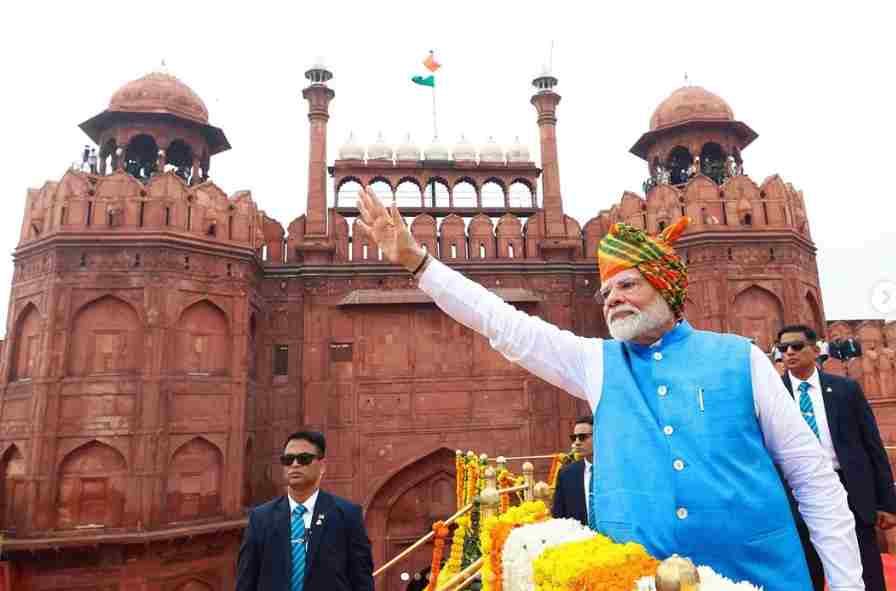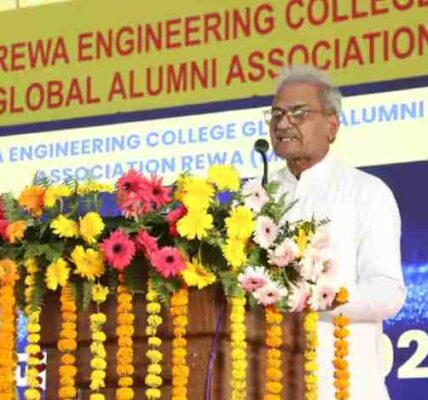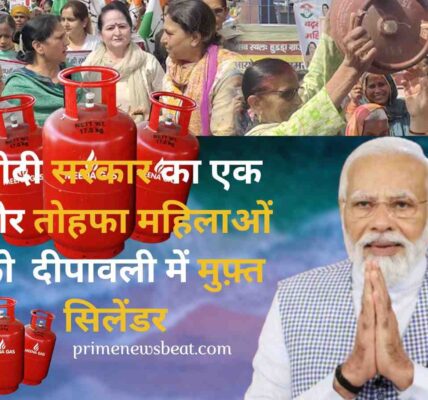PM Modi, at a Maharashtra poll rally, slammed Congress for its support to Article 370 resolution in Jammu and Kashmir Assembly.
PM Modi Criticizes Congress Over Support for Article 370 in Jammu & Kashmir Resolution
During a poll rally in Maharashtra, Prime Minister Narendra Modi criticized the Congress party for supporting a resolution in the Jammu and Kashmir Assembly backing Article 370. He accused Congress of siding with forces opposed to India’s interests by advocating for the special status provision, which had previously granted autonomy to Jammu and Kashmir. Modi asserted that the abrogation of Article 370 was essential for national unity and urged voters to consider Congress’s stance on this key issue.
PM Modi Accuses Congress of Weakening Nation for Political Gain at Maharashtra Rally
Speaking at an election rally in Akola, Maharashtra, Prime Minister Narendra Modi launched a strong attack on the Congress, accusing it of prioritizing its political strength over the country’s well-being. Modi argued that the Congress seeks to divide the country by exploiting caste differences, suggesting that the party thrives when the nation is weakened. “Congress knows that the weaker the country, the stronger the party will be. And when Congress is strong, the country becomes helpless,” he stated, urging voters to reject such divisive tactics and strengthen the nation.
Also Read 👉👉 ‘ऑनलाइन बच्चे पैदा होंगे’,जनार्दन मिश्रा BJP सांसद ने ‘मोबाइल से मोहब्बत पर काही बड़ी बात
PM Modi Accuses Congress of Dividing SC, ST, and OBC Communities for Political Gain
At a rally in Maharashtra, Prime Minister Narendra Modi criticized the Congress party for allegedly using divisive tactics among marginalized communities to secure political power. Modi accused Congress of preventing unity among Scheduled Castes (SC), Scheduled Tribes (ST), and Other Backward Classes (OBC), suggesting that the party intentionally fostered discord to fragment these communities’ voices and votes. By dividing them, he argued, Congress aimed to ensure its hold on government, prioritizing its own strength over the unity and empowerment of these communities.
PM Modi Urges SC Community Unity, Warns Against Congress’s ‘Dangerous Game’ of Division
Prime Minister Narendra Modi called for unity within the Scheduled Caste (SC) community, cautioning against what he described as the Congress party’s tactics to exploit internal divisions for political gain. Speaking at a rally, Modi warned that if the SC community remains divided along caste lines, Congress would seize the opportunity to weaken them and erode their rights, ultimately consolidating its own power. Emphasizing his message of “Ek Hai Toh Safe Hai” (Unity Ensures Safety), Modi urged voters to stay vigilant against what he termed as Congress’s “dangerous game” of dividing communities to secure their own position in power.
Jammu Leaders Clash Over Article 370 as BJP Faces Accusations of Betrayal
The debate over Article 370 has sparked intense political friction in Jammu, with BJP supporters and local activists accusing some Jammu leaders of betraying the region by backing the provision that once granted special status to Jammu and Kashmir. Anoop Kotwal, BJP’s social media coordinator, labeled Satish Sharma, a supporter of the National Conference (NC), as a “traitor,” equating him to historical figures who allied with outsiders. This criticism highlights the deepening rift between pro- and anti-Article 370 factions, with the BJP asserting that the special status has only fueled division, violence, and separatism in the region.
BJP Questions Jammu Leaders’ Loyalty Over Support for Article 370
BJP representatives and supporters in Jammu have sharply criticized local leaders like Surinder Choudhary and Satish Sharma for backing Article 370, accusing them of betraying the interests of Jammu and India’s unity. Neeraj Singh Dogra, head of Jammu Pradesh People’s Movement, accused Choudhary of siding with separatist sentiments by supporting the provision, which he claims has led to bloodshed and terrorism. Meanwhile, Choudhary has pushed back, questioning the BJP’s stance on protecting local jobs and resources from outsiders, adding to the regional discord over the issue.
Jammu Leaders Divided as NC Gains Support Amid Article 370 Controversy
Amidst the ongoing debate over Article 370, the National Conference (NC) has gained the support of several Hindu MLAs in Jammu, despite the BJP’s dominance in the region. Vikramaditya Singh Sumbria, a pro-BJP activist, accused Satish Sharma, who joined hands with NC, of being anti-Dogra and unfit to represent Jammu, which had overwhelmingly supported the BJP. Sumbria argued that Sharma and others were prioritizing the interests of Kashmir over Jammu’s mandate, intensifying the conflict between political factions as the region grapples with its future identity.
BJP Allies Denounce Pro-Article 370 Leaders in Jammu for ‘Betrayal’
Jammu’s pro-BJP voices have fiercely condemned leaders like Satish Sharma and Surinder Choudhary for their stance on Article 370, accusing them of aligning with Kashmir-centric agendas that overlook Jammu’s interests. Former university professor Hari Om claimed that many in Jammu viewed Choudhary as “Jammu’s Jaichand,” a symbol of betrayal, for his support of NC and the special status provision. The tension underscores the division within Jammu’s political landscape, where loyalty to the region is often measured by opposition to Article 370 and alignment with the BJP’s national vision.
1. What is Article 370? 
Article 370 of the Indian Constitution granted special status to the region of Jammu and Kashmir. It allowed the state to have its own constitution, a separate flag, and considerable autonomy over most matters, except defense, communications, finance, and foreign affairs.
2. Why was Article 370 introduced?
Article 370 was introduced to recognize the unique circumstances of Jammu and Kashmir’s accession to India in 1947. After the partition, the region’s Maharaja agreed to join India under certain conditions, leading to the provision of special autonomy through Article 370.
3. When and how was Article 370 abrogated?
On August 5, 2019, the Government of India, led by Prime Minister Narendra Modi, announced the abrogation of Article 370 through a Presidential Order and a resolution in Parliament. This decision revoked Jammu and Kashmir’s special status, leading to its reorganization into two Union Territories: Jammu and Kashmir, and Ladakh.
4. What impact did the abrogation of Article 370 have?
The abrogation of Article 370 ended Jammu and Kashmir’s autonomy and allowed the Indian government to apply national laws in the region, including laws related to property ownership, employment, and residency rights. It also paved the way for the reorganization of Jammu and Kashmir into two Union Territories, reducing its political autonomy and centralizing control.
5. What are the main reasons for the abrogation of Article 370?
Supporters of the move argue that the abrogation was necessary for the full integration of Jammu and Kashmir into India, enabling the region to benefit from the same laws and economic opportunities as the rest of the country. It was also seen as a step toward ending terrorism, separatism, and the perceived discriminatory policies that favored only certain groups in the state.
6. How did political parties react to the abrogation of Article 370?
The abrogation of Article 370 led to mixed reactions. The Bharatiya Janata Party (BJP) and supporters hailed the move as a long-awaited step toward national integration and the development of Jammu and Kashmir. On the other hand, parties like the National Conference (NC), People’s Democratic Party (PDP), and Congress criticized the move, calling it unconstitutional and harmful to the region’s identity and rights.
7. Did Article 370 give Jammu and Kashmir full autonomy?
No, Article 370 did not grant full autonomy. While it allowed Jammu and Kashmir to have its own laws and constitution in many areas, it still remained subject to the Indian Constitution in key matters like defense, foreign affairs, and communications. The autonomy was limited and subject to changes imposed by the central government.
8. What is the current status of Jammu and Kashmir after the abrogation of Article 370?
After the abrogation, Jammu and Kashmir was reorganized into two Union Territories: Jammu and Kashmir, and Ladakh. Both territories now have less autonomy, and central laws are applicable to them. The region’s special provisions were revoked, which means that Indian citizens from other states can now settle, buy property, and seek employment in the region.
9. Has the abrogation of Article 370 led to any changes in local demographics?
The abrogation of Article 370 has led to concerns about demographic changes in Jammu and Kashmir, especially with the possibility of people from other parts of India moving to the region and acquiring property. Critics argue that this could alter the region’s cultural and political landscape. However, supporters maintain that it will lead to economic development and greater integration.
10. What was the reaction of Jammu and Kashmir’s citizens to the abrogation of Article 370?
The reactions among the people of Jammu and Kashmir have been mixed. While some in Jammu, particularly those supportive of the BJP, welcomed the move, many in Kashmir, especially from political parties and separatist groups, strongly opposed it. The region saw protests, curfews, and restrictions after the decision, reflecting the deep divisions over the issue.
11. Is the revocation of Article 370 permanent?
The revocation of Article 370 is seen as permanent by the current government, as it was made through a Presidential order and a parliamentary resolution. However, the legality of this move has been contested by some political leaders and legal experts. The matter is still under judicial review in the Indian courts.
Article Aurthor Ai
महाराष्ट्र में एक चुनावी रैली में प्रधानमंत्री मोदी ने जम्मू-कश्मीर विधानसभा में अनुच्छेद 370 के प्रस्ताव का समर्थन करने के लिए कांग्रेस की आलोचना की।
जम्मू-कश्मीर में अनुच्छेद 370 के प्रस्ताव का समर्थन करने के लिए प्रधानमंत्री मोदी ने कांग्रेस की आलोचना की
महाराष्ट्र में एक चुनावी रैली के दौरान प्रधानमंत्री नरेंद्र मोदी ने जम्मू-कश्मीर विधानसभा में अनुच्छेद 370 के समर्थन में प्रस्ताव का समर्थन करने के लिए कांग्रेस पार्टी की आलोचना की। उन्होंने कांग्रेस पर विशेष दर्जे के प्रावधान की वकालत करके भारत के हितों का विरोध करने वाली ताकतों का साथ देने का आरोप लगाया, जिसने पहले जम्मू-कश्मीर को स्वायत्तता प्रदान की थी। मोदी ने जोर देकर कहा कि अनुच्छेद 370 को हटाना राष्ट्रीय एकता के लिए आवश्यक था और उन्होंने मतदाताओं से इस महत्वपूर्ण मुद्दे पर कांग्रेस के रुख पर विचार करने का आग्रह किया।
महाराष्ट्र की रैली में प्रधानमंत्री मोदी ने कांग्रेस पर राजनीतिक लाभ के लिए देश को कमजोर करने का आरोप लगाया
महाराष्ट्र के अकोला में एक चुनावी रैली में बोलते हुए प्रधानमंत्री नरेंद्र मोदी ने कांग्रेस पर जोरदार हमला किया और उस पर देश की भलाई से ज्यादा अपनी राजनीतिक ताकत को प्राथमिकता देने का आरोप लगाया। मोदी ने तर्क दिया कि कांग्रेस जातिगत मतभेदों का फायदा उठाकर देश को बांटना चाहती है, यह सुझाव देते हुए कि जब देश कमजोर होता है तो पार्टी फलती-फूलती है। उन्होंने कहा, “कांग्रेस जानती है कि देश जितना कमजोर होगा, पार्टी उतनी ही मजबूत होगी। और जब कांग्रेस मजबूत होती है, तो देश असहाय हो जाता है।” उन्होंने मतदाताओं से इस तरह की विभाजनकारी रणनीति को खारिज करने और देश को मजबूत बनाने का आग्रह किया।
पीएम मोदी ने कांग्रेस पर राजनीतिक लाभ के लिए एससी, एसटी और ओबीसी समुदायों को बांटने का आरोप लगाया
महाराष्ट्र में एक रैली में, प्रधानमंत्री नरेंद्र मोदी ने राजनीतिक सत्ता हासिल करने के लिए हाशिए पर पड़े समुदायों के बीच विभाजनकारी रणनीति का कथित तौर पर इस्तेमाल करने के लिए कांग्रेस पार्टी की आलोचना की।
मोदी ने कांग्रेस पर अनुसूचित जातियों (एससी), अनुसूचित जनजातियों (एसटी) और अन्य पिछड़ा वर्गों (ओबीसी) के बीच एकता को रोकने का आरोप लगाया, यह सुझाव देते हुए कि पार्टी ने जानबूझकर इन समुदायों की आवाज़ और वोटों को विभाजित करने के लिए कलह को बढ़ावा दिया। उन्होंने तर्क दिया कि उन्हें विभाजित करके, कांग्रेस का उद्देश्य सरकार पर अपनी पकड़ सुनिश्चित करना था, इन समुदायों की एकता और सशक्तिकरण पर अपनी ताकत को प्राथमिकता देना।
यह भी पढे 👉👉 1 लाख रुपये में घर ले आएं Maruti Suzuki Brezza CNG
प्रधानमंत्री मोदी ने अनुसूचित जाति समुदाय की एकता का आह्वान किया, कांग्रेस के विभाजन के ‘खतरनाक खेल’ के खिलाफ चेतावनी दी
प्रधानमंत्री नरेंद्र मोदी ने अनुसूचित जाति (एससी) समुदाय के भीतर एकता का आह्वान किया, उन्होंने कांग्रेस पार्टी की आंतरिक विभाजन का राजनीतिक लाभ के लिए फायदा उठाने की रणनीति के खिलाफ चेतावनी दी। एक रैली में बोलते हुए, मोदी ने चेतावनी दी कि यदि एससी समुदाय जाति के आधार पर विभाजित रहता है, तो कांग्रेस उन्हें कमजोर करने और उनके अधिकारों को खत्म करने के अवसर का लाभ उठाएगी, अंततः अपनी शक्ति को मजबूत करेगी।
“एक है तो सुरक्षित है” के अपने संदेश पर जोर देते हुए, मोदी ने मतदाताओं से कांग्रेस के समुदायों को विभाजित करने के “खतरनाक खेल” के खिलाफ सतर्क रहने का आग्रह किया, ताकि वे सत्ता में अपनी स्थिति सुरक्षित कर सकें।
जम्मू के नेताओं में अनुच्छेद 370 को लेकर टकराव, भाजपा पर विश्वासघात का आरोप
अनुच्छेद 370 को लेकर बहस ने जम्मू में तीव्र राजनीतिक घर्षण को जन्म दिया है, भाजपा समर्थकों और स्थानीय कार्यकर्ताओं ने जम्मू के कुछ नेताओं पर उस प्रावधान का समर्थन करके क्षेत्र के साथ विश्वासघात करने का आरोप लगाया है, जिसने कभी जम्मू और कश्मीर को विशेष दर्जा दिया था।
भाजपा के सोशल मीडिया समन्वयक अनूप कोटवाल ने नेशनल कॉन्फ्रेंस (एनसी) के समर्थक सतीश शर्मा को “देशद्रोही” करार दिया और उनकी तुलना ऐसे ऐतिहासिक लोगों से की जिन्होंने बाहरी लोगों के साथ गठबंधन किया। यह आलोचना अनुच्छेद 370 के समर्थक और विरोधी गुटों के बीच बढ़ती दरार को उजागर करती है, जिसमें भाजपा का कहना है कि विशेष दर्जे ने क्षेत्र में विभाजन, हिंसा और अलगाववाद को ही बढ़ावा दिया है।
भाजपा ने अनुच्छेद 370 के समर्थन को लेकर जम्मू के नेताओं की वफादारी पर सवाल उठाए
जम्मू में भाजपा प्रतिनिधियों और समर्थकों ने अनुच्छेद 370 का समर्थन करने के लिए सुरिंदर चौधरी और सतीश शर्मा जैसे स्थानीय नेताओं की तीखी आलोचना की है और उन पर जम्मू और भारत की एकता के हितों के साथ विश्वासघात करने का आरोप लगाया है।
जम्मू प्रदेश पीपुल्स मूवमेंट के प्रमुख नीरज सिंह डोगरा ने चौधरी पर इस प्रावधान का समर्थन करके अलगाववादी भावनाओं का साथ देने का आरोप लगाया, जिसके बारे में उनका दावा है कि इसने रक्तपात और आतंकवाद को बढ़ावा दिया है। इस बीच, चौधरी ने स्थानीय नौकरियों और संसाधनों को बाहरी लोगों से बचाने के भाजपा के रुख पर सवाल उठाते हुए इस मुद्दे पर क्षेत्रीय कलह को और बढ़ा दिया है।
अनुच्छेद 370 विवाद के बीच नेशनल कॉन्फ्रेंस को समर्थन मिलने से जम्मू के नेताओं में मतभेद
अनुच्छेद 370 पर चल रही बहस के बीच, नेशनल कॉन्फ्रेंस (एनसी) ने जम्मू में कई हिंदू विधायकों का समर्थन हासिल कर लिया है, जबकि इस क्षेत्र में भाजपा का दबदबा है। भाजपा समर्थक कार्यकर्ता विक्रमादित्य सिंह सुम्ब्रिया ने एनसी से हाथ मिलाने वाले सतीश शर्मा पर डोगरा विरोधी होने और जम्मू का प्रतिनिधित्व करने के लिए अयोग्य होने का आरोप लगाया, जिसने भाजपा को भारी समर्थन दिया था।
सुम्ब्रिया ने तर्क दिया कि शर्मा और अन्य जम्मू के जनादेश पर कश्मीर के हितों को प्राथमिकता दे रहे हैं, जिससे राजनीतिक गुटों के बीच संघर्ष तेज हो गया है क्योंकि क्षेत्र अपनी भविष्य की पहचान के साथ जूझ रहा है।
भाजपा के सहयोगी दलों ने जम्मू में अनुच्छेद 370 के समर्थक नेताओं की ‘विश्वासघात’ के लिए निंदा की
जम्मू के भाजपा समर्थक लोगों ने अनुच्छेद 370 पर उनके रुख के लिए सतीश शर्मा और सुरिंदर चौधरी जैसे नेताओं की कड़ी निंदा की है, उन पर कश्मीर-केंद्रित एजेंडे के साथ जुड़ने का आरोप लगाया है जो जम्मू के हितों की अनदेखी करते हैं। पूर्व विश्वविद्यालय के प्रोफेसर हरिओम ने दावा किया कि जम्मू में कई लोग चौधरी को “जम्मू के जयचंद” के रूप में देखते हैं, जो विश्वासघात का प्रतीक है, क्योंकि उन्होंने एनसी और विशेष दर्जा प्रावधान का समर्थन किया है। यह तनाव जम्मू के राजनीतिक परिदृश्य के भीतर विभाजन को रेखांकित करता है, जहां क्षेत्र के प्रति वफादारी को अक्सर अनुच्छेद 370 के विरोध और भाजपा के राष्ट्रीय दृष्टिकोण के साथ संरेखण द्वारा मापा जाता है।
1. अनुच्छेद 370 क्या है?
भारतीय संविधान के अनुच्छेद 370 ने जम्मू और कश्मीर क्षेत्र को विशेष दर्जा दिया। इसने राज्य को अपना संविधान, एक अलग झंडा और रक्षा, संचार, वित्त और विदेशी मामलों को छोड़कर अधिकांश मामलों में काफी स्वायत्तता की अनुमति दी।
2. अनुच्छेद 370 क्यों लाया गया?
अनुच्छेद 370 को 1947 में जम्मू और कश्मीर के भारत में विलय की अनूठी परिस्थितियों को मान्यता देने के लिए लाया गया था। विभाजन के बाद, क्षेत्र के महाराजा कुछ शर्तों के तहत भारत में शामिल होने के लिए सहमत हुए, जिससे अनुच्छेद 370 के माध्यम से विशेष स्वायत्तता का प्रावधान हुआ।
3. अनुच्छेद 370 को कब और कैसे निरस्त किया गया?
5 अगस्त, 2019 को, प्रधान मंत्री नरेंद्र मोदी के नेतृत्व में भारत सरकार ने राष्ट्रपति के आदेश और संसद में एक प्रस्ताव के माध्यम से अनुच्छेद 370 को निरस्त करने की घोषणा की। इस निर्णय ने जम्मू और कश्मीर के विशेष दर्जे को रद्द कर दिया, जिससे इसे दो केंद्र शासित प्रदेशों: जम्मू और कश्मीर और लद्दाख में पुनर्गठित किया गया।
4. अनुच्छेद 370 के निरस्त होने का क्या प्रभाव पड़ा?
अनुच्छेद 370 के निरस्त होने से जम्मू और कश्मीर की स्वायत्तता समाप्त हो गई और भारत सरकार को इस क्षेत्र में राष्ट्रीय कानून लागू करने की अनुमति मिल गई, जिसमें संपत्ति के स्वामित्व, रोजगार और निवास अधिकारों से संबंधित कानून शामिल हैं। इसने जम्मू और कश्मीर को दो केंद्र शासित प्रदेशों में पुनर्गठित करने का मार्ग भी प्रशस्त किया, जिससे इसकी राजनीतिक स्वायत्तता कम हो गई और नियंत्रण केंद्रीकृत हो गया।
5. अनुच्छेद 370 को निरस्त करने के मुख्य कारण क्या हैं?
इस कदम के समर्थकों का तर्क है कि जम्मू और कश्मीर के भारत में पूर्ण एकीकरण के लिए इसे निरस्त करना आवश्यक था, जिससे इस क्षेत्र को देश के बाकी हिस्सों की तरह ही समान कानूनों और आर्थिक अवसरों का लाभ मिल सके। इसे आतंकवाद, अलगाववाद और कथित भेदभावपूर्ण नीतियों को समाप्त करने की दिशा में एक कदम के रूप में भी देखा गया, जो राज्य में केवल कुछ समूहों के पक्ष में थीं।
6. अनुच्छेद 370 को निरस्त करने पर राजनीतिक दलों की क्या प्रतिक्रिया थी?
अनुच्छेद 370 को निरस्त करने पर मिली-जुली प्रतिक्रियाएँ हुईं। भारतीय जनता पार्टी (भाजपा) और समर्थकों ने इस कदम को राष्ट्रीय एकीकरण और जम्मू और कश्मीर के विकास की दिशा में एक लंबे समय से प्रतीक्षित कदम बताया। दूसरी ओर, नेशनल कॉन्फ्रेंस (एनसी), पीपुल्स डेमोक्रेटिक पार्टी (पीडीपी) और कांग्रेस जैसी पार्टियों ने इस कदम की आलोचना की और इसे असंवैधानिक तथा क्षेत्र की पहचान और अधिकारों के लिए हानिकारक बताया।
7. क्या अनुच्छेद 370 जम्मू-कश्मीर को पूर्ण स्वायत्तता देता था?
नहीं, अनुच्छेद 370 पूर्ण स्वायत्तता नहीं देता था। हालांकि इसने जम्मू-कश्मीर को कई क्षेत्रों में अपने स्वयं के कानून और संविधान रखने की अनुमति दी, लेकिन यह रक्षा, विदेशी मामलों और संचार जैसे प्रमुख मामलों में भारतीय संविधान के अधीन रहा। स्वायत्तता सीमित थी और केंद्र सरकार द्वारा लगाए गए परिवर्तनों के अधीन थी।
8. अनुच्छेद 370 के निरस्त होने के बाद जम्मू-कश्मीर की वर्तमान स्थिति क्या है?
निरस्त होने के बाद, जम्मू-कश्मीर को दो केंद्र शासित प्रदेशों में पुनर्गठित किया गया: जम्मू-कश्मीर और लद्दाख। दोनों क्षेत्रों में अब कम स्वायत्तता है और उन पर केंद्रीय कानून लागू होते हैं। क्षेत्र के विशेष प्रावधानों को निरस्त कर दिया गया, जिसका अर्थ है कि अब अन्य राज्यों के भारतीय नागरिक इस क्षेत्र में बस सकते हैं, संपत्ति खरीद सकते हैं और रोजगार की तलाश कर सकते हैं।
9. क्या अनुच्छेद 370 के निरस्तीकरण से स्थानीय जनसांख्यिकी में कोई बदलाव आया है?
अनुच्छेद 370 के निरस्तीकरण से जम्मू और कश्मीर में जनसांख्यिकी परिवर्तनों के बारे में चिंताएँ पैदा हुई हैं, खासकर भारत के अन्य हिस्सों से लोगों के इस क्षेत्र में आने और संपत्ति अर्जित करने की संभावना के कारण। आलोचकों का तर्क है कि इससे क्षेत्र के सांस्कृतिक और राजनीतिक परिदृश्य में बदलाव आ सकता है। हालाँकि, समर्थकों का कहना है कि इससे आर्थिक विकास और अधिक एकीकरण होगा।
10. अनुच्छेद 370 के निरस्तीकरण पर जम्मू और कश्मीर के नागरिकों की क्या प्रतिक्रिया थी?
जम्मू और कश्मीर के लोगों के बीच प्रतिक्रियाएँ मिली-जुली रही हैं। जहाँ जम्मू में कुछ लोगों, खासकर भाजपा के समर्थकों ने इस कदम का स्वागत किया, वहीं कश्मीर में कई लोगों, खासकर राजनीतिक दलों और अलगाववादी समूहों ने इसका कड़ा विरोध किया। इस निर्णय के बाद क्षेत्र में विरोध प्रदर्शन, कर्फ्यू और प्रतिबंध देखे गए, जो इस मुद्दे पर गहरे मतभेदों को दर्शाता है।
11. क्या अनुच्छेद 370 का निरस्तीकरण स्थायी है?
वर्तमान सरकार अनुच्छेद 370 को हटाने के फैसले को स्थायी मानती है, क्योंकि इसे राष्ट्रपति के आदेश और संसदीय प्रस्ताव के ज़रिए हटाया गया था। हालाँकि, यह फैसला अभी भी लंबित है।
FOLLOW LINK 👇👇👇👇👇👇👇





1 COMMENTS